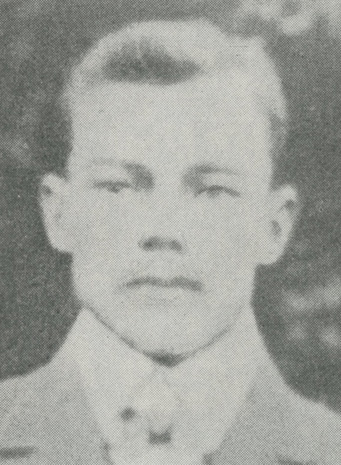Solianych, Dmytro
Solianych, Dmytro [Солянич, Дмитро; Soljanyč; aka Sollanych, Daniel], b 1874 or 1876 in Ustia, Sniatyn county, Galicia, d 12 January 1940 in Saskatoon, Saskatchewan. Prose writer, political, and community activist. Born into a peasant family, Solianych was, in his youth, an activist of the Ukrainian-Ruthenian Radical Party that combined agrarian-socialist ideas with the battle for national emancipation. Together with Kyrylo Trylovsky, he was involved in the foundation of the first Sich society in Galicia in the winter of 1899–1900, but they failed to obtain official registration for it. Solianych emigrated to Canada in March 1903 and initially settled in the province of Alberta where he worked as a miner and lived in Lethbridge and Edmonton. He established a Ukrainian reading room called Postup (Progress) in Lethbridge in 1904. In a letter co-signed with the Ukrainian-Canadian socialist activist Toma Tomashevsky, Solianych turned to Ivan Franko with a request to send Ukrainian books for the enlightenment of the Ukrainian miners and farmers in Alberta. In 1910 Solianych moved to the United States with his family. He first lived in Spokane, Washington, where he worked in the logging industry, before he purchased a farm in Rathdrum, Kootenai county, Idaho. Not much is known about his activities in the United States where he lived isolated from the Ukrainian community. In 1926 he moved back to Edmonton where he found himself in difficult economic circumstances. Subsequently, he spent the last decade of his life in Saskatoon, Saskatchewan. Solianych resumed his activism in the early 1930s and became one of the leaders of the Ukrainian National Federation in Saskatoon. He collaborated with activists from eastern Ukraine and sought to win over the Doukhobors in Canada for the Ukrainian cause. In 1934 he launched a fundraising campaign for Kyrylo Trylovsky on occasion of the latter's seventieth anniversary.
Solianych was a self-taught writer. In his youth, he was given books by Ivan Franko who frequently visited the villages in Sniatyn county. Solianych’s literary works were heavily influenced by the stories of Vasyl Stefanyk who resided in Rusiv, just a few kilometres away from Solianych’s native Ustia. Under the influence of Stefanyk, Solianych wrote naturalist stories about the everyday life of the Ukrainian peasantry in the villages in Sniatyn county. Destitution, violence, illness, and death are described in his literary works in great detail. Solianych also extensively used the Pokutia dialect in his texts to convey direct speech or internal monologues of his protagonists. In contrast to Stefanyk’s succinct and highly concentrated style, Solianych’s stories are considerably longer and they frequently contain descriptions of unexpected twists of fate. An idiosyncratic feature of Solianych’s prose are romantic relationships that often remain unfulfilled or end tragically as a result of social, economic, and religious constraints. In later years, Solianych also wrote about his experiences as a Ukrainian immigrant in the United States and Canada, and described encounters with carriers of different languages and cultures. His only book Khto vynuvatyi (Who is Guilty, 1932) is a collection of short stories that appeared in Edmonton and was printed by the company of his younger brother Ivan Solianych (John Sollanych, 1890–1967). Dmytro Solianych was a regular contributor to various Ukrainian newspapers in the United States, Canada, and Europe.
BIBLIOGRAPHY
Tryl'ovs'kyi, P. (ed). Hei, tamnahori ‘Sich’ ide! Propam’iatna knyha ‘Sichei’ (Edmonton 1965)
Kharyton, Vasyl. ‘Dmytro Solianych: povernennia v Ukraiinu’ in Solianych, Dmytro. Khto vynuvatyi. Opovidannia, lysty. Uporiadkuvannia, peredmova ta prymitky Vasylia Kharytona (Sniatyn 2004)
Kaltenbrunner, Matthias. Das global vernetzte Dorf. Eine Migrationsgeschichte (Frankfurt am Main 2017)
Matthias Kaltenbrunner
[This article was written in 2021.]
This subject is not referenced in any other entries in the Internet Encyclopedia of Ukraine.
